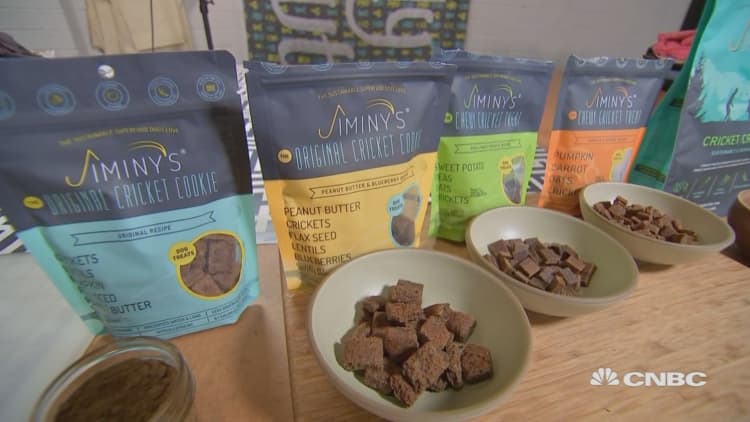What's for dinner?
According to Barclays, it just might be edible insects.
A new report by the investment bank cites the expanding market around the alternative protein source and predicts the edible bug industry could be worth $8 billion by 2030, up from a little under $1 billion just last year.
The product is already found in experimental cuisines and boasts an eco-friendly reputation. But it has yet to go mainstream, despite the proven market for meat alternatives.
The plant-based meat market generated revenue of $4.2 billion globally in 2018, driven largely by companies such as Impossible Foods and Beyond Meat.
Yum Brands' KFC, the nation's largest fried chicken chain, recently announced that it had struck a deal with Beyond Meat to sell 100% plant-based nuggets in more than 60 restaurants in the Charlotte, North Carolina, and Nashville markets. That limited rollout began on Jan. 29.
According to KFC, the decision to sell the nuggets, named Beyond Fried Chicken, follows what they call an "overwhelmingly successful" one-day test launch at a single Atlanta KFC in August. One week's worth of the nuggets sold out in five hours.
Consumers are already receptive and interested in alternative protein sources beyond traditional beef, pork and chicken. Some analysts say bugs could soon follow suit and become the next big protein of the future.
The United Nations' Food and Agriculture Organization has encouraged the consumption of insects since 2013, advocating for the inclusion of insects in a daily diet, as a sustainable and nutritious alternative to resource-intensive staples such as beef, poultry and fish.
Making eating bugs fun
But edible bugs can be a hard sell, especially in the United States.
Chef Joseph Yoon, who is the executive director of New York City-based advocacy group Brooklyn Bugs, aims to raise appreciation and awareness for edible insects through creative programming and by incorporating insects into his haute cuisine.
Yoon said the first step to encouraging Americans to adopt insects as food is redefining the public's conditioned perception of insects as pests and making the bug-eating experience fun.
"There is no silver bullet of what will make Americans all change their mind about eating insects," Yoon said. "And so it's important for us to just demonstrate this broad variety of how you can really utilize insects. So if you want to hide it and bake with it, if you want to make it sweet or savory, it's really just showing that there are no limitations to cooking with edible insects and that there is literally something for everybody."
Crickets as a 'gateway bug'
Anne Carlson, CEO and founder of cricket-based dog food and treat company Jiminy's, has discovered the best way to worm her way into millennial hearts is through their dogs.
Carlson said her company has found success in appealing to younger generations who love the idea that their pet food is more environmentally friendly.
Dogs in the U.S. consume over 32 billion pounds of protein each year, said Carlson, who has dogs of her own. That production volume can leave a hefty carbon footprint.
"Cows are never going to be the answer. So we took the idea and pivoted, started to look at all different protein sources," said Carlson, who said her daughter's concerns about climate change motivated her to pursue a more sustainable option in reducing dog food's carbon "paw" print.
Carlson started experimenting with crickets, which she calls a "gateway bug."
Crickets emit fewer greenhouse gases and require exponentially less land because they're farmed in small, controlled environments, versus the large fields usually necessary for grazing cattle.
"The more I dug into it, I found the U.N. study that said insects could be the answer to world hunger. It just seemed like the perfect answer," Carlson said. "And then when we tried it with the dogs, the dogs loved it. We knew we had something."
The Food and Drug Administration has not yet officially declared bugs as an approved ingredient for pet food, though Carlson noted dogs eat bugs in nature all the time. To help move past the FDA's regulatory hurdle, she has commissioned research about the health benefits and digestibility of crickets in pet food. Carlson plans to submit a peer-reviewed dossier with those findings to the FDA.
Edible bug advocates and entrepreneurs said they have long turned to entomophagy — the consumption of insects as food — for both humans and dogs because it just makes sense from a sustainability and nutritional standpoint.
Producing the same amount of protein from bugs requires a fraction of the resources to grow compared with other sources of protein, and bugs tend to have more fiber because you consume the entire thing, said Monica Martinez, CEO and founder of Don Bugito, an edible insect snack company based in San Francisco.
Martinez said many insects are packed with protein, fiber, good fats and vital minerals — at levels on par with or greater than those found in fish and meat.
Don Bugito borrows its sweet and savory ingredients from Martinez's native Mexico: toasted crickets tossed with cayenne pepper and lime juice or coated with dark chocolate, melted sugar and coconut.
"80% of the biomass of the planet is made out of insects. It doesn't make any sense that we are not tapping into that," she said.
So what do bugs taste like? Jane Wells and the CNBC team conducted their own taste tests: from cricket quinoa hash to Japanese wasps (Vespula flaviceps to be exact) over matcha-dusted tofu to toasted mealworms and cricket-based dog food — nothing was off limits and (mostly) everything was delicious.




